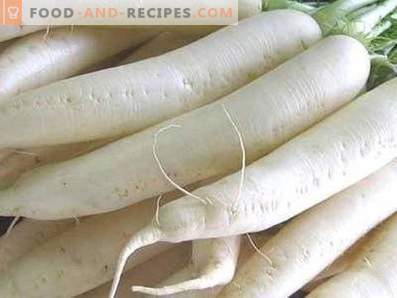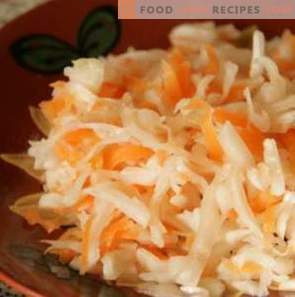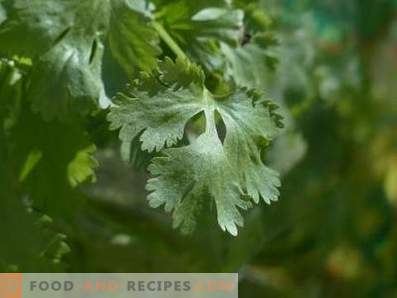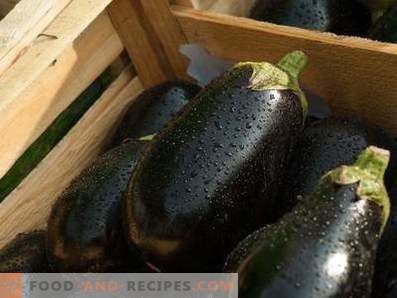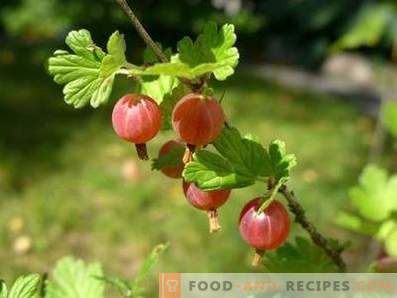
Daikon is one of the varieties of sowing radish. Scientists suggest that Japan is the birthplace of this plant. Even in ancient times, local farmers were able to withdraw daikon from a lobe by selective breeding. That is why you can often hear how this variety is called Japanese radish.
Daikon is a juicy root vegetable having a light sharp taste without bitterness. It is eaten raw, stewed and boiled, salted, pickled, added to salads and soups. In alternative medicine, the roots of this plant are used to treat the widest range of disorders in the body.
Botanical description of daikon
Japanese radish is an annual plant with a bulky rosette of narrow green lyrate leaves. Each of them is dissected into 8-20 pairs of side blades. The leaf blades of the plant are sitting on long whitish-green petioles, covered with a waxy coating.
The culture in June blooms with large purple flowers, gathered in racemes. The fruits of the plant are yellowish-green beaded pods with elongated noses. Inside each of them is found from 4 to 13 large seeds of light brown color.
The storage organ of a Japanese radish is a volumetric root crop of conical or cylindrical shape. The root weight can vary from 350 g to 16 kg, length - from 20 to 120 cm, diameter - from 35 to 110 mm. Fully formed root crop has a white or greenish-white color.
Nutritional value of Japanese radish
100 g of daikon contains:
- 1, 193 g of proteins;
- 4, 087 g of carbohydrates;
- 0, 001 g of fat;
- 0,792 g of ash;
- 0, 473 g of starch;
- 0, 191 g of sugars;
- 95, 268 g of water;
- 1, 387 g of dietary fiber.
Vitamins in Daikon
A 100-gram serving of Japanese radish contains the following vitamins:
- Biotin, H - 18, 796 μg;
- ascorbic acid, C - 29, 812 mg;
- pyridoxine, B6 - 0, 291 mg;
- Niacin equivalent, PP - 2, 079 mg;
- riboflavin, B2 - 0, 176 mg;
- folic acid, B9 - 18, 002 μg;
- retinol equivalent, A - 9, 806 µg;
- tocopherol equivalent, E - 2, 093 mg;
- pantothenic acid, B5 - 2, 109 mg;
- thiamine, B1 - 0,739 mg.
Calories of Japanese radish
Raw Japanese radish is a low-calorie vegetable. 100 g of this product contains 20, 877 kcal. The average calorie size of the root (800 g) is 167, 016 kcal.
Boiled daikon contains 19, 202 kcal per 100 g. The energy value of a similar portion of Japanese radish stew - 21, 739 kcal. 100 g of pickled vegetables contain 20, 314 kcal.
Useful Items in Daikon
Trace elements in 100 g of Japanese radish:
- selenium - 0 792 mkg;
- manganese - 0, 749 mg;
- copper - 9.068 mg;
- iodine - 2, 091 mkg;
- zinc - 0, 172 mg;
- iron - 0, 837 mg.
Macroelements in 100 g of daikon:
- sulfur - 4, 982 mg;
- chlorine - 6, 893 mg;
- phosphorus - 27, 809 mg;
- potassium - 279, 092 mg;
- sodium - 15, 733 mg;
- magnesium - 8, 721 mg;
- calcium - 26, 922 mg.
Useful properties of Japanese radish
- Japanese radish helps replenish strength, cope with chronic fatigue, increase the overall tone of the body, and reduce the negative effects of stress. Tonic of this product is prepared according to the following recipe: grind the vegetable on a grate, squeeze the juice from the resulting slurry, mix it with honey and lemon juice in a ratio of 10: 10: 1. The mixture take 6 tbsp. spoons a day.
- Daikon is a vegetable rich in fiber. With this product, toxins, slags and excess fluids can be accelerated.
- Japanese radish is a source of low-calorie carbohydrates needed by diabetics and people seeking to lose weight.
- Daikon contains substances that reduce inflammation and alleviate pain in rheumatism. Anti-rheumatic agent from it is prepared as follows: rub the vegetable on a grater, and then combine the resulting gruel with vodka and honey in a ratio of 3: 1: 2. Mixture insist 2 hours, drain out the released fluid and use it to grind diseased joints.
- Dishes made from daikon have a beneficial effect on the condition and function of the liver and kidneys. In the juice of this vegetable found compounds that can dissolve kidney stones and prevent their occurrence.
- The use of raw Japanese radish helps remove radionuclides from the body.
- Daikon is a rich source of vitamins. Dishes from this vegetable culture help to avoid seasonal avitaminosis and hypovitaminosis.
- Substances present in Japanese radish contribute to the production of hemoglobin. People suffering from anemia, it is useful three times a day to take 1 tbsp. spoon daikon juice with added sugar.
- Folk healers use daikon for the treatment of purulent wounds. Apply a sterile napkin with the juice of this vegetable culture and apply it to the damaged area for 30-40 minutes. The procedure is carried out every 6-8 hours.
- Long-term use of daikon helps to eliminate excess cholesterol from the body, normalizes heart rhythm, strengthens the myocardium, and reduces the risk of developing heart disease.
- Substances present in Japanese radish increase appetite, stimulate the production of digestive juices, and prevent the development of intestinal disorders. Vegetable contains enzymes that speed up the digestion of foods rich in starch.
- Daikon contains volatile production, capable of destroying bacteria, viruses, fungal microflora and prevent their reproduction. People who regularly include Japanese radish in their diet are less likely to suffer from infectious diseases.
- Enzymes, esterases and amylases contained in daikon accelerate carbohydrate, protein and lipid metabolism in the body.
- Antioxidant compounds that are rich in Japanese radish, slow down the aging of body tissues. In addition, they reduce the likelihood of the formation of malignant tumors.
- People who include daikon in their diet at least 2-3 times a week are less likely to suffer from colds.
- Japanese radish helps improve sleep, get rid of insomnia, speed up sleep.
- Daikon is an effective remedy for diseases of the upper respiratory tract. The juice of this vegetable helps to weaken the unproductive dry cough, speed up the release of sputum, prevent the spread of inflammatory processes.
- In folk medicine, the daikon pulp is used as a sedative. In order to relieve nervous tension, it is enough to eat 5-6 tbsp. spoons of grated root.
- With a rich broth of Japanese radish, rinse the mouth with toothache.
- A small portion of daikon salad helps to cope with a heavy hangover.
- Useful nutrients that enter the digestive tract when eating Japanese radish help to improve eyesight and reduce the adverse effects of high loads on the visual apparatus.
- Daikon juice has choleretic properties. In order to cope with stagnation in the gall bladder, it is enough to drink 1/3 cup of this drink every day.
- Japanese radish contains a whole range of substances that have a beneficial effect on the reproductive system. The product helps to increase the potency and improve the composition of the ejaculate in men, increase the likelihood of conception and alleviate menopausal symptoms in women. Daikon juice activates the production of milk in young mothers who are breastfeeding.
- With long-term consumption of daikon in food, the condition of hair, skin and nails is significantly improved, and the growth of strands is accelerated.
- Japanese radish is an effective remedy for freckles. In order to whiten the skin on problem areas, it is enough to wipe it twice a day with a cotton pad soaked in the juice of this vegetable culture.
Contraindications and harm to daikon
- Japanese radish is contraindicated in people suffering from gout, gastritis, duodenal or gastric ulcer, glomerulonephritis, nephritis, severe vascular, pancreatic or heart disease.
- The abuse of daikon can lead to irritation of the mucous membrane of the digestive tract, diarrhea and flatulence.
- Older people and people suffering from metabolic disorders can eat Japanese radish only after consulting a doctor.
- Daikon can provoke the development of allergic reactions. Therefore, people suffering from allergies to vegetables of the Cabbage family should refuse to use dishes prepared from it.
